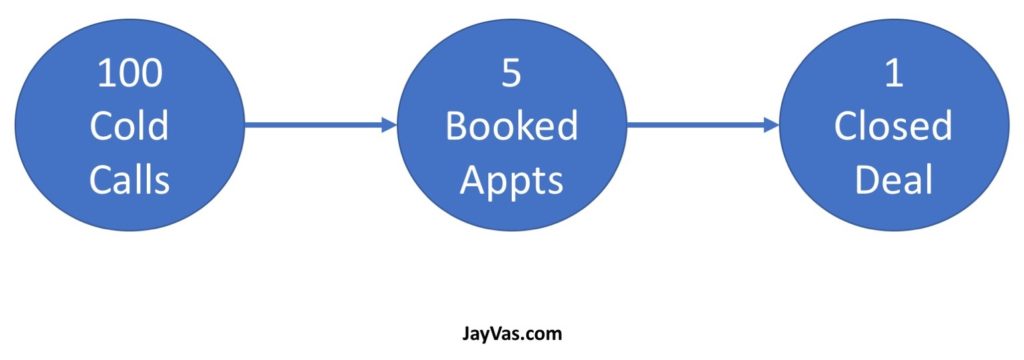Cold calling has gotten a bad rap over the years.
Movies like Boiler Room and Wolf of Wall Street have made cold calling look slimy.
But the reality is, as an entrepreneur, cold calling might be one of the best things you could do early in your career.
It’s the “school of hard knocks” way to learn how to sell. Almost nothing compares to cold calling, not cold emails, not cold tweets, nor cold LinkedIn messages.
The only thing more “hard knocks” than cold calling might be door-to-door sales (but I’ll have to leave that to someone else to write about).
Cold calling is also very effective at generating sales, especially if you’re just getting your business off the ground.
In this blog post, I am going to show you how cold calling really kickstarted my entrepreneurial career and helped me build an award-winning PPC agency that generated millions of dollars in revenue. I will also provide some actionable tips for you to get started.
How I Cut My Teeth Cold Calling
Let’s rewind to 2014. I had just quit my job and started my first business, a PPC agency called ClientFlo. My plan was to cold call prospective businesses and sell them over the phone.
There was only one problem: I’ve never cold-called anyone in my life.
In fact, my entire sales experience was very limited, to say the least. At my previous job, I spent all day inside Excel spreadsheets with the odd break in between to communicate with a human.
I started reading books and watching lots of videos on cold calling, but nothing would prepare me for the real thing.
After my first day of cold calling, I was ready to quit.
Up to that point in my life, I really didn’t even know what rejection felt like. Then all at once, I had complete strangers harshly rejecting me over the phone.
On each call, my hands would shake and my heart would race. It was absolutely terrifying. I hated it so much.
But I really had no choice, I had bills to pay. I made the rash decision of quitting a job that I worked so hard to obtain, without any other income coming in. I was too embarrassed to tell my parents so the option of moving back home wasn’t really available to me.
Needless to say, I was determined to not fail.
A colleague of mine, Rajiv, really motivated me to keep going. He was experienced in cold calling, and in fact, worked for a competing firm. He would come by my place after he was finished work, to help me with my scripts and improve my selling techniques (he would eventually join ClientFlo, full-time).
After a week of cold calling, I started booking demos. Showing prospects what my agency could do for them. This gave me a boost of confidence.
A week after that, I closed my first sale over the phone.
That first deal felt so good. It was all I needed to keep hammering at this cold calling thing.
It eventually became second nature to me. I stopped looking at the phone like it was some sort of evil torture device and started looking at it like it was a money printer.
The more times I picked up that phone, the more money I ended up making.
Cold calling generated millions of dollars in revenue over the 5-year period I ran my agency. It gave me the opportunity to build a sustainable business, employ motivated staff, and work with amazing clients. It also led to ClientFlo being ranked among the Top PPC Agencies in Canada.
Cold calling was the key to getting my PPC agency off the ground. Without it, I wouldn’t have been able to gain the traction I needed and probably gone back to working for my old employer.
Why Cold Calling Is So Necessary
Beyond just the money it generated for me personally, cold-calling gave me a set of skills that have set me up for life.
It gave me the confidence to speak to anyone and sell them on whatever needed to be sold. It showed me fundamental truths about human psychology, what moves people, and how to persuade them.
Selling is the key to entrepreneurship. No matter where you are in your entrepreneurial career, I promise you, you will never stop selling.
As an entrepreneur, you will always be selling:
- Customers to buy your product/service
- Investors to put money in your company
- Employees to work for you and help grow your company
- Vendors to extend you better credit terms
- Advisors to help guide your company
The list can go on forever.
Bottom line is, you need to master selling. In my opinion, there is no better way to do this than by cold calling.
Key Takeaways
I’m not going to get into the nitty-gritty details of cold calling. There are plenty of free resources online where you can learn specific selling techniques.
Rather, I will share some high-level things I’ve learned.
#1 – It’s a Numbers Game
You might not be able to see it at first, but after several weeks the numbers start to become very predictable.
If you are just starting out, it’s easy to get discouraged after the first few rejections. But if you zoom out a bit, the process starts looking like a math equation.
Let’s say you are aiming to close 1 new deal a week. It may take you 5 appointments to close that 1 new deal. And it may take 100 cold calls to book those 5 appointments.

This means that, if you’re making 20 cold calls per day, expect to get rejected 19 times.
Don’t take it personally, it’s just a numbers game. Take the rejections with grace and move onto your next prospect.
What matters is that you make those 20 cold calls each day, that’s the only thing you can control in that equation.
At ClientFlo, the numbers became very predictable, not far from the example I mentioned above. This predictability allowed me to hire salespeople, and confidently tell them what to expect.
If each deal was worth a few thousand dollars, and I wanted 5 new deals each week, I knew exactly how many calls my team and I had to make to get there.
#2 – Write a Script
If you take variables out of the equation, you’re more likely to have consistent results.
You don’t need to follow a script verbatim but have some structure. Some common questions, phrases, and rebuttals need to be written down.
Test different opening lines, closing lines, keep track of what’s working and what’s not.
There are a ton of free sales script templates to download online (just Google it). Pick the one you feel will resonate with your customers, tweak it to your liking, and optimize it as you go.
At ClientFlo we tested different scripts on a regular basis, continually improving how we communicated with prospects.
#3 – Qualify Your Leads
Half of selling is really just speaking to the right people. This means you need to be careful about how you allocate your time.
You need to qualify your leads by asking important questions upfront. Otherwise, you might just be wasting your time if you go through the entire process only to find out that the prospect wasn’t qualified.
What is considered “qualified” will vary from industry to industry.
At ClientFlo, we would only cold call prospects that were already spending money on PPC ads. The first questions we’d ask were to uncover how much they’re spending on ads, and whether they were locked into a contract with another agency.
This immediately let us know whether the prospect was worth pursuing or not.
#4 – Put Yourself in Your Customer’s Shoes
A good salesman is really just trying to solve their customers problems.
Prospects don’t want to hear about how amazing your product/service is, all the features and benefits.
They want to hear what you can do for them.
Empathize with the customer. Put yourself in their shoes. Speak their language. Constantly ask yourself: “how can I make their life easier?“
A big vertical for us was law firms so we learned to speak the language of lawyers, using words like “cases” and “billable hours”. We took the time to understand how they operated, we even knew how much money they made per case. We did this so we could better understand our customers and help solve their problems.
#5- Have The Close Down Pat
The most important part of your entire sales process is the close.
You can’t fumble this. You have to have a clear picture of what “yes” from the customer looks likes.
Is it getting the customer to sign the agreement? Getting them to give you their credit card details? Whatever it is, you need to ask for it, get the yes and then proceed with the close.
At ClientFlo, after we got the customer to say yes to working with us, we would walk them through the agreement over the phone. From there we would obtain their credit card information, and let them know they have 24 hours to review the agreement before the billing commenced. Often times, they would just sign the agreement while on the phone.

#6 – Take Breaks
It’s really easy to burn out when cold calling. It’s a lot of very repetitive work and the constant rejection does take a toll on you mentally.
The key is to take breaks.
Breaks should be long enough to give yourself mental rest, but not too long that your sales pipeline dries up. If your pipeline dries up, it’s really hard to get it going again, so avoid this at all costs.
At ClientFlo we went on various retreats to give ourselves a breather. They were great, it gave us the rest we needed and time to bond as a team.

Final Thoughts
It’s easy to dismiss cold calling nowadays with the advent of all the digital channels available to reach customers.
However, I firmly believe that none of those channels compare to cold calling. It is the best way entrepreneurs can learn to sell and obtain skills that will set them up for life.
If you do want to do some further reading, I’d recommend Influence and Psychology of Selling from my reading list. That being said, no book will teach you how to cold call.
If you really want to master cold calling, in the words of Leonardo DiCaprio in Wolf of Wall Street:
“Pick Up The Phone and Start Dialling”.
Hi there! I’m Jay Vasantharajah, Toronto-based entrepreneur and investor.
This is my personal blog where I share my experiences building businesses, making investments, managing personal finances, and traveling the world.
Subscribe below, and expect to get a couple of emails a month with some free, valuable, and actionable content.





4 thoughts on “Cold Calling Isn’t Dead And Why All Entrepreneurs Should Learn It”